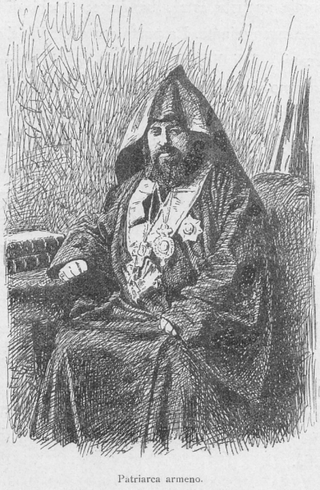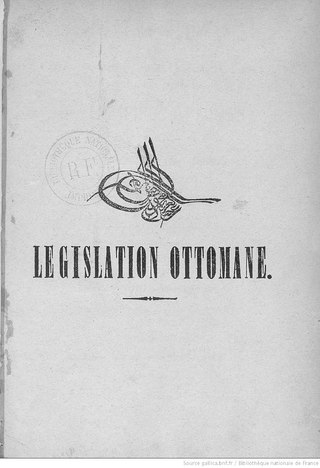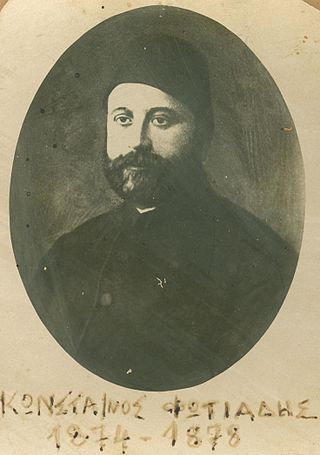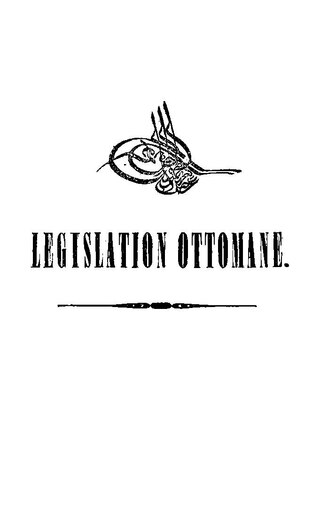
The Gülhane Hatt-ı Şerif or Tanzimât Fermânı was a proclamation by Ottoman Sultan Abdülmecid I in 1839 that launched the Tanzimât period of reforms and reorganization in the Ottoman Empire. The 125th anniversary of the edict was depicted on a former Turkish postcard stamp.

The Bosnia Vilayet was a first-level administrative division (vilayet) of the Ottoman Empire, mostly comprising the territory of the present-day state of Bosnia and Herzegovina, with minor parts of modern Montenegro. It bordered Kosovo Vilayet to the south. Before the administrative reform in 1867, it was called the Bosnia Eyalet. In the late 19th century it reportedly had an area of 46,000 square kilometres (17,900 sq mi).
Shaʽban is the eighth month of the Islamic calendar. It is called the month of "separation", as the word means "to disperse" or "to separate" because the pagan Arabs used to disperse in search of water.

Hakham Bashi - חכם באשי is the Turkish name for the Chief Rabbi of the nation's Jewish community. In the time of the Ottoman Empire it was also used for the chief rabbi of a particular region of the empire, such as Syria or Iraq, though the Hakham Bashi of Constantinople was considered overall head of the Jews of the Empire.

The Armenian Patriarch of Constantinople, also known as Armenian Patriarch of Istanbul, is today head of the Armenian Patriarchate of Constantinople, one of the smallest Patriarchates of the Oriental Orthodox Churches but one that has exerted a very significant political role and today still exercises a spiritual authority.

The Imperial Reform Edict was a February 18, 1856 edict of the Ottoman government and part of the Tanzimat reforms. The decree from Ottoman Sultan Abdulmejid I promised equality in education, government appointments, and administration of justice to all regardless of creed. The decree is often seen as a result of the influence of France and Britain, which assisted the Ottoman Empire against the Russians during the Crimean War (1853–1856) and the Treaty of Paris (1856) which ended the war.
A kaza was an administrative division of the Ottoman Empire. It is also discussed in English under the names district, subdistrict, and juridical district. Kazas continued to be used by some of the empire's successor states. At present, they are used by Iraq, Lebanon, Jordan, and in Arabic discussion of Israel. In these contexts, they are also known by the Arabic name qada, qadā, or qadaa.
Sheri is a female given name, from the French for beloved, and may refer to:

Wāli, Wā'lī or vali is an administrative title that was used in the Muslim world to designate governors of administrative divisions. It is still in use in some countries influenced by Arab or Muslim culture. The division that a Wāli governs is called Wilayah, or Vilayet.
Gregory "Ligor" Aristarchis, also known as Aristarchi Bey, was an Ottoman diplomat of Phanariote Greek ethnicity, compiler of a corpus of Ottoman legislation.

Takvim-i Vekayi was the first fully Turkish language newspaper. It was launched in 1831 by Sultan Mahmud II, taking over from the Moniteur ottoman as the Official Gazette of the Ottoman Empire. With the beginning of the Tanzimat reform period, Takvim-i Vekayi produced versions in multiple language editions. It ceased publication in 1878, resuming in 1891–2, before being closed again. It resumed in 1908 until around 1922. In the 1831-1878 period it published a total of 2119 issues - an average of slightly less than one a week.

Konstantinos Photiadis was the Ottoman-appointed Prince of Samos from 1874 to 1879.
The Senate of the Ottoman Empire was the upper house of the parliament of the Ottoman Empire, the General Assembly. Its members were appointed notables in the Ottoman government who, along with the elected lower house Chamber of Deputies, made up the General Assembly. It was created in its first incarnation according to the Ottoman constitution of 1876, which sought to reform the Ottoman Empire into a constitutional monarchy.

The Ottoman Code of Public Laws, also known as the Düstur or Destur or Doustour, was a set of laws in the Ottoman Empire. The name in Ottoman Turkish comes from a Persian word for a law collection, "Destur". It includes the penal code as well as some civil and commercial laws. The Persian and Turkish use of the word influenced also influenced the Arabic word Doustour which is the literal translation of Constitution.

Législation ottomane, ou Recueil des lois, règlements, ordonnances, traités, capitulations et autres documents officiels de l'Empire ottoman is a collection of Ottoman law published by Gregory Aristarchis and edited by Demetrius Nicolaides. The volumes were published from 1873 to 1888.
Demetrius Nicolaides, also known as Nikolaidis Efendi, was an Ottoman Greek journalist and compiler of legislation. Johann Strauss, author of A Constitution for a Multilingual Empire: Translations of the Kanun-ı Esasi and Other Official Texts into Minority Languages, wrote that Nicolaides was "an extremely active but somewhat enigmatic figure in the press life of 19th century Istanbul".
The Ministry of Justice was the justice ministry of the Ottoman Empire, based in Constantinople. It also served as the Ministry of Religions.
Konstantinoupolis, originally Heptalophos or Eptalofos, was a Greek-language newspaper and periodical published in the Ottoman Empire.












